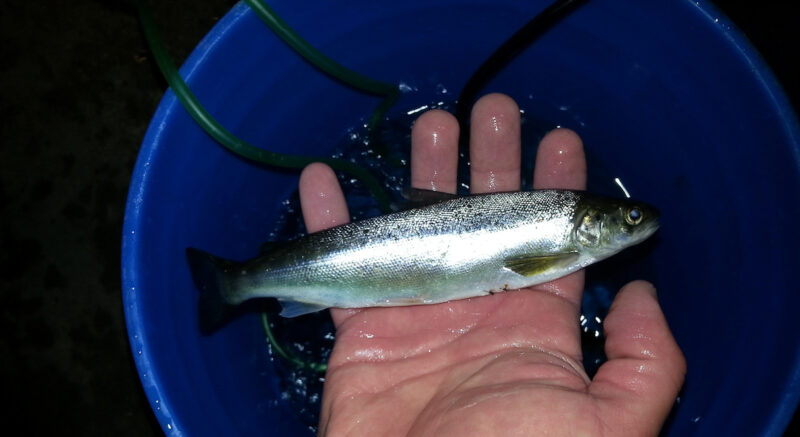Cermaq-Kuterra salmon pact will enhance food security
Baby fish pact between different sides of the salmon farming industry shows the importance of working together for the benefit of local communities in BC.
By Fabian Dawson
SeaWestNews
Ocean-based salmon farmer Cermaq Canada has signed a three-year agreement to continue providing Atlantic salmon smolts to the Kuterra land-based fish farm facility – a pact that will further enhance food security in British Columbia.
Cermaq Canada farms Atlantic salmon in 25 sea sites on the west and east coasts of Vancouver Island with four hatcheries across northern Vancouver Island.
Kuterra, which was established by the Namgis First Nation in 2013, has been consistently opposed to ocean-based salmon farming in BC, fighting the industry in courts and with high sea protests.
After flailing for years despite millions in federal and philanthropic funding, Kuterra entered into an agreement last December with Emergent Holdings LLC, which is now leasing and operating the land-based facility on Vancouver Island, near Port McNeill, BC.
Emergent Holdings is a US-based private investment partnership and plans to use the Kuterra operations primarily as a research facility, as it builds land-based aquaculture businesses on the East Coast of the United States.
Cermaq has been providing smolts to Kuterra since 2014, but this agreement marks the formalization of the arrangement and greater business certainty for all involved.
“We are happy to be in a position to be able to support a fellow local farmer and food supplier,” said David Kiemele, managing director for Cermaq Canada.
“The recent Covid-19 pandemic has illustrated how important local food security is and emphasizes the importance of working together for the benefit of local communities and the province,” he said.
The agreement will run from October 2021 through to October 2024 which will ensure business continuity and the ongoing supply of high-quality salmon for our farm said Jacob Bartlett, CEO, of Emergent Holdings LLC.
“In investigating possible options, it made sense to formalize the purchase of smolts from Cermaq Canada as we have been happy with the quality of the smolts provided, and the overall health, growth and performance of the smolts provided to-date,” he said.
Despite its profitability struggles, Kuterra has been the go-to example by the anti-fish farming lobby in BC, which wants to oust salmon farmers from the oceans to grow salmon in tanks on land.
The province has seen many failed attempts to grow either Pacific or Atlantic salmon in land-based recirculating aquaculture systems (RAS) over the past 20 years. Kuterra remains the only-land based Atlantic salmon farm in BC.
Experts from the U.N., the industry, the scientific community, aquaculture insurance giants, and even land-based fish farmers, have said growing fish in tanks to market size is a technology that has yet to be proven commercially and in terms of sustainability.
Several other studies, from government, industry and scientists have also shown that growing fish on land to market size will impact climate change at a greater pace, because of the increased demands for freshwater, land, and energy for land-based fish farming.
In BC alone, moving the current production of Atlantic salmon to land based tanks will result in an increase 22,881,000 kgs of Greenhouse Gas (GhG) emissions. That is equivalent to the energy needed per year to power a population of 52,200 or a city the size of North Vancouver.
Raising land based salmon also costs 12 times more than ocean farming, the studies have shown.
Tellingly, there is no record of any new investments for a land-based Atlantic salmon grow-out facility in BC.
Key players behind Kuterra, are now also seeking government financing while looking for investors for an aquaculture park to grow market-size fish on land
.

